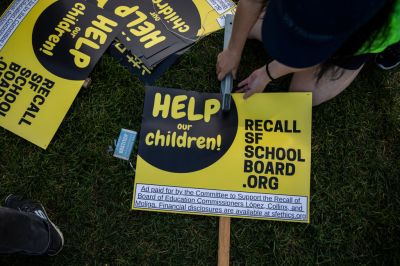ASHBURN, Va.—Loudoun County’s K-12 curriculum and instruction meeting kicked off last Thursday as a snapshot of the mundane: a laundry list of policies involving family life education, whether to charge families for music books, and how to prioritize American Sign Language for high school students.
Then came the culture war update: A brief primer on a draft policy that, beginning January 1, requires schools to notify parents when students are to be taught sexually explicit material in school. “We have teams of teachers right now kind of crowdsourcing titles of book club books,” a visibly uncomfortable Neil Slevin, executive director of the county’s Division of Teaching and Learning, said to the small crowd. “They’re working together to try to screen the books.”
The new policy was drafted in response to a Virginia Senate bill signed by GOP Gov. Glenn Youngkin in April. It represents a big win for Republicans nationwide who see local school board races as venues for culture war fights, including pandemic-related school closures and mask mandates, plus the roles race and gender identity should play in K-12 education.
Even though they don’t attract the same level of media attention as politicians running for higher office, school board candidates across the country are being boosted by conservative-leaning political action committees. Many PACs align closely with Youngkin, whose outsize focus on critical race theory and school closures on the campaign trail last year re-upped K-12 education as a winning issue for the GOP across the country.
“It wasn’t like last year, where really we were the only game in town besides Virginia’s governor race, which is intrinsically also tied to school board elections,” said Ryan Girdusky. He’s the president of 1776 Project, an anti-1619 Project political action committee focused on electing conservatives to school boards and abolishing critical race theory from K-12 education. “If it’s a choice between me and John Fetterman, I’m not gonna make the front page of the New York Times.”
Groups like Girdusky’s are cropping up all over the country and investing heavily in local school board races—vetting, recruiting, and training candidates who align with their values. Many are also helping organize efforts to recall school board members they see as unresponsive to parental concerns.
Recall efforts spiked significantly in 2021, largely fueled by pandemic-related school closures. That momentum has carried into this year, with the nonpartisan digital encyclopedia Ballotpedia tracking 47 total recall efforts nationwide, down from last year’s 92 but still higher than average.
San Francisco’s school board recall in early 2022 is a prime example of this phenomenon, with more than 70 percent of voters supporting the ouster of three school board members who were focused on renaming schools rather than reopening them.
Dissatisfaction with current school boards could grow louder in light of new data from the National Assessment of Educational Progress (NAEP), which show that test scores in mathematics for fourth and eighth graders nationwide saw the largest decline since the organization first began testing kids in 1990. Roughly one-third of fourth- and eighth-grade students surveyed this year couldn’t read at a “basic” level, the NAEP found.
The conservative fight for increased parental involvement in K-12 education has unsurprisingly sparked backlash from parents who tend to place more trust in institutional authority and left-leaning special interest groups that have sought to portray some conservative parents as extremist or bigoted.
Many school board meetings become war zones by proxy, as happened often in 2021. “Either they tend to be these sleepy, tedious, disorganized affairs, or they tend to be really frustrating with tons of parents and community members and teachers showing up to each get their two minutes or three minutes of mic time,” said Frederick Hess, director of Education Policy Studies at the conservative-leaning American Enterprise Institute.
Besides policies and candidates themselves, conservative groups have another goal related to school-board races: getting more people to vote. School board races often occur in less notable off-cycle election years, where nationwide turnout typically hovers between 8 and 10 percent of eligible voters.
“The only people that it was serving to have school board elections all over the place was the teachers unions, because they got their people out to vote, and they were paying attention to it, and they’re uniquely connected to it,” said Tiffany Justice with Moms for Liberty, a conservative group that has endorsed more than 200 school board candidates across the country this year. “You should know when the elections are—it shouldn’t be on some random month in some random year with no advertising around it.”
Hence conservative groups’ efforts to move school board elections to coincide with state and federal elections, with the explicit goal of boosting turnout.
“School boards are America’s shadow governments,” said Derrell Bradford, president of 50Can, a centrist educational reform advocacy group. “They are elected in low turnout proceedings, and they spend billions of local and federal dollars and almost no one knows that they’re doing it.”







Please note that we at The Dispatch hold ourselves, our work, and our commenters to a higher standard than other places on the internet. We welcome comments that foster genuine debate or discussion—including comments critical of us or our work—but responses that include ad hominem attacks on fellow Dispatch members or are intended to stoke fear and anger may be moderated.
With your membership, you only have the ability to comment on The Morning Dispatch articles. Consider upgrading to join the conversation everywhere.